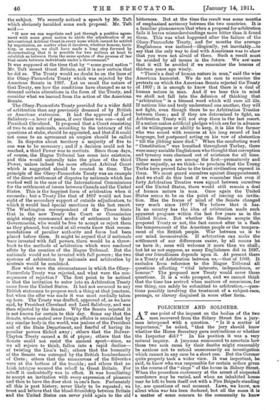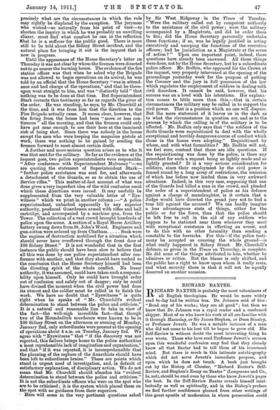POLICEMEN AND SOLDIERS.
T one point of the inquest on the bodies of the two men recovered from the Sidney Street fire a jury- man interposed with a question. " Is it a matter of importance," he asked, " that the jury should know whether the Home Secretary gave instructions or whether the Inspector did ? " In his position it was a very natural inquiry. A juryman summoned to ascertain how these two men came by their deaths might reasonably be anxious not to extend unnecessarily an investigation which cannot in any case be a short one. But the Coroner quite properly took a wider view. It was important, he said, to know who was responsible for certain orders given in the course of the " siege " of the house in Sidney Street. When the procedure customary at the arrest of suspected murderers may be varied, and when an inhabited house may, be left to burn itself out with a Fire Brigade standing by, are questions of real moment. Laws, we know, are silent when war has been declared, but all the same it is a matter of some concern to the community to know precisely what are the circumstances in which the rule may rightly be displaced by the exception. The juryman who wished—so naturally from his point of view—to shorten the inquiry in which he was probably an unwilling sh-arer, must find what comfort he can in the reflection that he is a sufferer for the public good. There is more still to be told about the Sidney Street incident, and the natural place for bringing it out is the inquest that is now in progress. Until the appearance of the Home Secretary's letter on Thursday it was not clear by whom the firemen were directed not to go nearer the burning house. The evidence of the fire station officer was that when he asked why the Brigade was not allowed to begin operations on its arrival, he was told-by an official that the Home Secretary "was in attend- ance and had charge of the operations," and that he there- upon went straight to him, and was "distinctly told" that nothing was to be done at that time. But Superintendent Stark corrects this testimony so far as regards the giver of the order. He was standing, he says, by Mr. Churchill at the time, and it was from him that the direction to the Fire Brigade actually came. It seems clear, however, that the firing from the house bad been " more or less con- tinuous " all the morning, and that the firemen could only hive got near enough to use their hose at the imminent risk of being shot. Since there was nobody in the house except the men who were keeping the magazine pistols at work, there was nothing to be gained by sending the firemen forward to meet almost certain death.
A gurther and more serious question arises as to who it was that sent for the military. So far as the evidence at the inquest goes, two police superintendents were responsible. "After conference with Superintendent Mulvaney "—we are quoting the statement of Superintendent Stark— "further police assistance was sent for, and afterwards a detachment of the Guards, so as to obtain the use of Service rifles." This matter-of-fact account of what was done gives a very imperfect idea of the wild confusion amid which these directions were issued. It may usefully be supplemented from the very valuable letter of " Eye- witness " which we print in another column :—" A police superintendent, unbacked apparently by any superior authority, produced Guardsmen armed with rifles and ball cartridge, and accompanied by a machine gun, from the Tower. The collection of a vast crowd brought hundreds of police upon the scene. A section of a Royal Horse Artillery battery swung down from St. John's Wood. Engineers and gun-cotton were ordered up from Chatham Such were the engines of destruction mobilised for a situation which Should never have overflowed through the front door of 100 Sidney Street." It is not wonderful that in the first instance the public should have been slow to believe that all this was done by one police superintendent after con- ference with another, and that they should have rushed to the conclusion that the Home Secretary himself had been the directing spirit of the whole conflict. No lesser authority, it was assumed, could have taken such a responsi- bility upon himself. Only he could have brought order out of confusion and safety out of danger; only he could have divined the moment when the civil power had done its utmost and the soldier must be called in to finish the work. We have no doubt that " Eyewitness " is quite right when he speaks of " Mr. Churchill's evident determination to stand between the police and criticism." It is a natural and reasonable line to take in view of the fact—the well-nigh incredible fact—that though two of the Houndsditch murderers were known to be in 100 Sidney Street on the afternoon or evening of Monday, January 2nd, only subordinates were present at the opening of operations about 4 a.m. on Tuesday, January 3rd. We agree with " Eyewitness " that " if the discovery was not reported, this failure brings home to the police authorities a most reprehensible lack of imagination and organisation," and that "if it was reported, it is incomprehensible that the planning of the capture of the Anarchists should have been left to subordinate brains." These are points which stand in urgent need of investigation, and, in default of satisfactory explanation, of disciplinary action. We do not mean that Mr. Churchill should abandon his " evident determination to stand between the police and criticism." It is not the subordinate officers who were on the spot who are to be criticised ; it is the system which placed them on the spot with no guidance from their superiors. Here will come in the very pertinent questions asked by Sir West Ridgeway in the Times of Tuesday. " Were the military called out by competent authority to the assistance of the civil power ; were the military accompanied by a Magistrate, and did he order them to fire ; did the Home Secretary personally undertake these functions ; if so, was he legally justified in acting executively and usurping the functions of the executive officers ; had he jurisdiction as a Magistrate at the scene of action ? " Upon one important point, indeed, these questions have already been answered. All these things were done, not by the Home Secretary, but by a subordinate police officer. Mr. Bodkin, who appeared for the Crown at the inquest, very properly intervened at the opening of the proceedings yesterday week for the purpose of putting the Coroner and the jury in full possession of the law which regulates the employment of soldiers in dealing with civil disorders. It cannot be said, however, that his success was on a level with his intentions. His explana- tion comes to little more than this,—that in certain circumstances the military may be called in to support the civil power. That is a position which no one will dispute. But the mere statement of it leaves us in the dark as to what the circumstances in question are, and as to the process by which the calling in of the military is to be effected. Mr. Bodkin only says that " the soldiers of the Scots Guards were requisitioned to deal with the wholly exceptional and terribly dangerous course of conduct which those in the house were adopting." Requisitioned by whom, and with what formalities ? Mr. Bodkin will not, we feel sure, contend that these are idle questions. If the requisitioning was done by the police, is there any precedent for such a request being so lightly made and so lightly granted ? It is a very serious consideration for soldiers, since their employment by the civil power is fenced round by a long array of restrictions, the omission of which has before now landed them in very awkward situations. Indeed, in this very case, supposing that one of the Guards had killed a man in the crowd, and pleaded the order of a superintendent of police as his defence against a charge of manslaughter, is it certain that a Judge would have directed the grand jury not to find a true bill against the accused ? We can hardly imagine a less advantageous state of things, either for the public or for the force, than that the police should be left free to call in the aid of any soldiers who happen to be stationed near them whenever they meet with exceptional resistance in effecting an arrest, and to do this with no other formality than sending a constable to the barracks. For this—if the police testi- mony be accepted as covering the whole ground—is what really happened in Sidney Street. Mr. Churchill's defence, as given in the Times on Thursday, is complete. He did none of the things attributed to him, whether by admirers or critics. But the blame is only shifted, and the public has a right to know upon whom it really rests, and what security there is that it will not be equally deserved on another occasion.







































 Previous page
Previous page